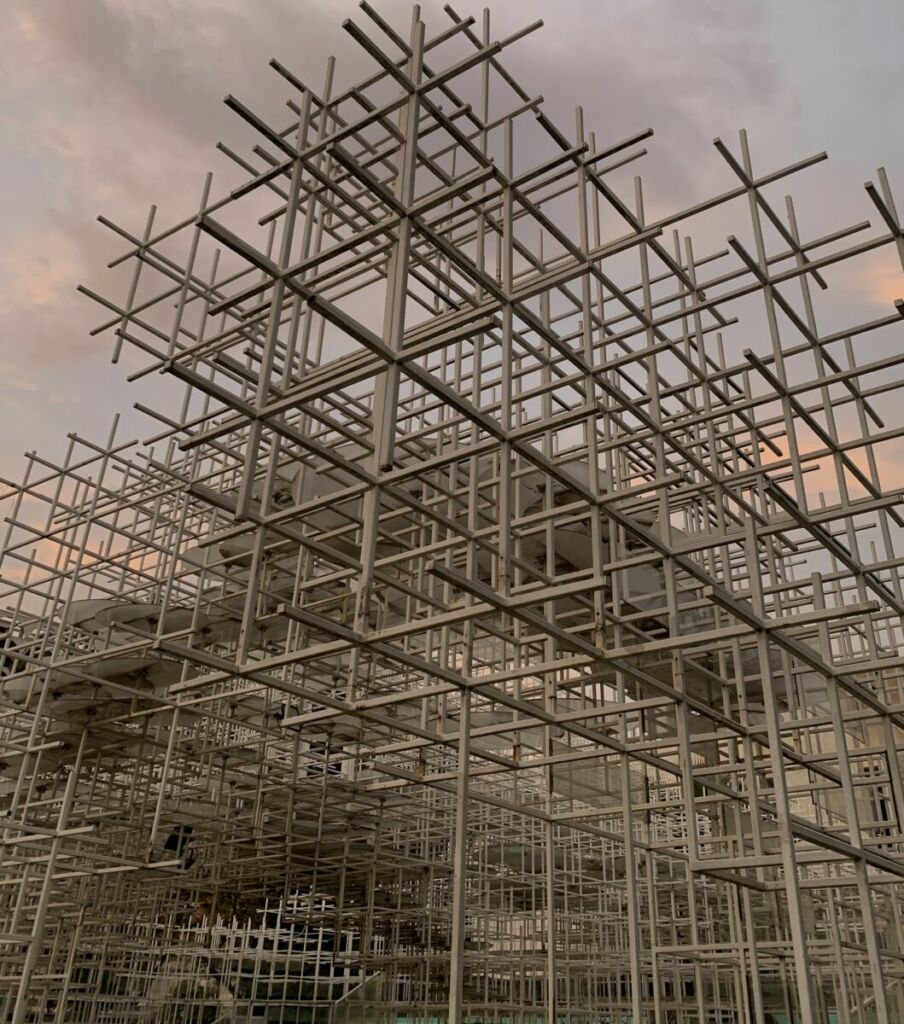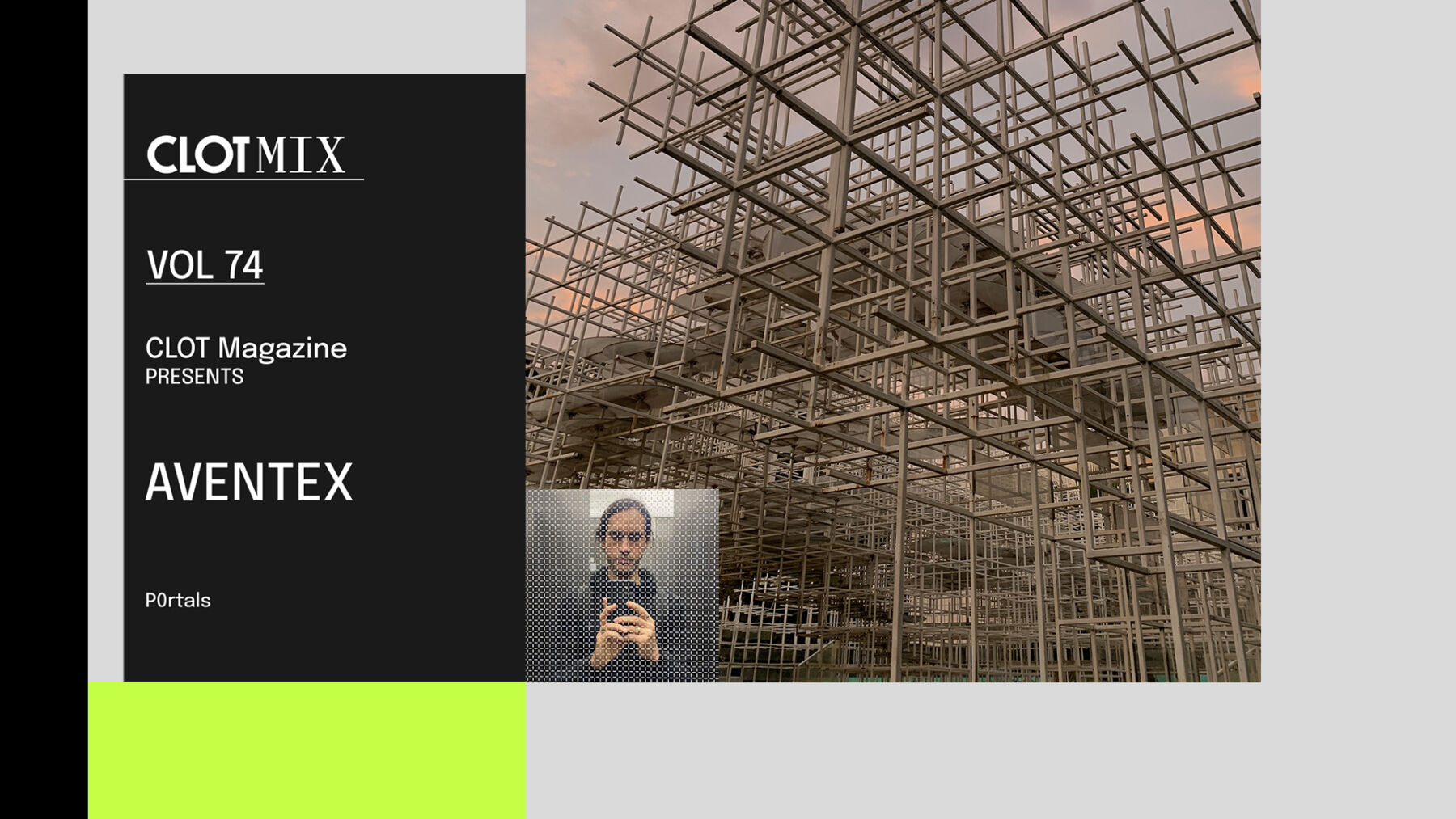Text by CLOT Magazine

Next in our mixtape series, we welcome London-based musician and DJ Aventex (aka Alec Tullio) with a mixtape he has prepared ahead of his performance at our next live music event, Portals 02.
The Australian artist is a staple fixture of the London experimental and noise-punk scenes. He is involved in several bands (Keno, Skitter, Zek) and drives the fast-paced rhythmic lines with his relentless and precise drumming.
One of his main current projects, Casing, was born as a solo project during the pandemic out of existential dread and societal dismay. The project, which has received lots of positive reception and press attention, has since evolved into a full band (with Dom Stevenson (aka YAWS) also from Keno, and Liam Cadogan of Eros Catheter) for live performances and recordings.
Patterns of Deterioration, Casing’s first EP, was described as a six-song dive into depravity, nihilism, and desperation. It was praised as one of the most exciting newcomer voices in noise-punk. Over a year of live shows, Casing has developed into another beast entirely. The finishing touches are being made to a new album showcasing this new fusion of sludge, grind and power electronics they now exist in.
With his DJ moniker, Aventex began his quest for musical exploration and investigation around the same time as becoming a resident at Threads Radio at the station’s inception. The shows can often focus in-depth on a particular genre or be a trademark, unrestrained concoction of whatever would be interesting pieced together unconventionally. He tells us his DJ sets follow in the same vein but with a meticulous selection to suit the specificity of the event. Ranging from all-out driving techno to challenging noise and experimental, EBM, Acid, or ambient, there is not much that isn’t on the cards. In a nutshell, it is music for the fresh and/or fried brain.
For the mix he has prepared for us, he mentions that he has relished the opportunity to gather some more of the oddball and experimental stuff that’s at some further reaches of digging: playing some genres I wouldn’t normally include in a mix and trying to work them where the outcome is very all over the place, which is my favourite approach. An hour techno mix can be fun and has its place, but absurd gems and challenging genre pairings are where it’s at, in my opinion. Enjoy!”
You are a part of London´s noise-punk scene, involved in several bands and music projects, including Skitter, Keno, and your solo outing Casing, with which you recently recorded a new album. What is your creative process when you compose for these different projects? Also, more specifically, what was it like for Casing’s new album production?
I think the creative process for these different projects can be a little sporadic, but I think an amazing tool for any musician is the humble voice note on their phone. I usually try my best to hum some semblance of an idea for a song into the phone and then work on the idea from there in many cases.
Skitter is really great in the way that a lot of the writing is shared between us. I’m a terrible guitar player but can play bass, so I can make ideas/riffs/full songs on my bass and show/teach them to Danny; Shereen will make the guitar parts for it, and then I’ll already have the drums parts in my head. Lyrical and vocal duties are left to John during this process. Or it could be Shereen or Danny come to practice with a new riff, and we figure out structures and extra parts. So it’s a very shared project creatively, where everyone has a great deal of input.
Casing is a little different, where I have written all the instrumentation (drums & bass) and lyrics for it, but it has been functioning as a live band for a couple of years now. I will teach Dom the riffs on bass and we’ll rehearse that with Liam doing his live noise. So, for the latest Casing release, it was a much more regular formula of a band going into the studio and recording their parts compared to me doing it completely solo and encountering all the trial and error of a big novice recording something more or less for the first time. Shout out to Wayne Adams at BearBitesHorse for making the new recordings sound as massive and mental as they do.
And lastly, with Keno, Dom has been much more primary in creating the songs on guitar, and we will jam on these with Reid, our bass player, and there’s usually quite a lot of chopping and changing/adding and subtracting parts until we’re all really happy with the songs. I feel like this process might become more shared between Dom and Reid in future writing, but at the moment, the system works well.
You also DJ regularly, with sets that gravitate towards the moodier and noisier sides of the dancefloor. How do you usually approach a DJ set or a mix?
For me it really depends on what sort of night/vibe it will be. I’m constantly stockpiling a wide range of music that can suited to different nights, like a heavier techno night, an event more focused on experimental/noise, or pubs and house parties where the music can be daft and cheesy. So when it comes time to pick what to play, there are ample playlists to delve into. Shout out Soulseek.
You also have a monthly Threads radio programme. Could you tell us a bit more about it and what having this space brings to your practice in general (or at a more personal level)?
Perfect History started with the radio’s inception when it was called 199 Radio, based out of New River Studios back around 2007. Since it left that location and had a rebrand to Threads, it has suffered the plight of callous developers and poorly managed spaces, so there has been a large chunk of its operations without a physical studio space since it left The Cause in Tottenham. It was due to be housed in Ridley Road Social Club, but this has since fallen through. So, for quite a long time now, I have been doing pre-recorded shows for the station each month and waiting with much anticipation for the new home to open so I can get back into a live radio studio environment. That’s the beauty of it, right?
In terms of practice in general, I would dare say I’ve mastered the Ableton pre-record radio show and can still make proper mixes with my set-up at home, but I’m very keen to get back into a live studio again. More information about the new studio should hopefully be around the corner.
What is your relationship with technology and analogue for your productions nowadays? How do you cope with technology (screen/digital) overload?
Admittedly, my technical knowledge for production is very basic. Recording Casing with Ableton was more or less my first venture in recording and using that program, and then after arrangement, the more technical side was handed over to the more highly skilled. However, It’s definitely something I’ve always wanted to learn more about. I always tell myself I should be utilising the abundance of masterful producer friends I have around me for education.
Having said that, focussing on music means the technology side is more limited as I will be taking a more hands-on approach to playing instruments rather than being glued to a screen mixing, etc. I guess if the overload comes from anywhere, it’s having to juggle practicing/performing with three or more projects throughout the week and having time for your own life as well. But as punishing and exhausting as that is, I still enjoy it.






